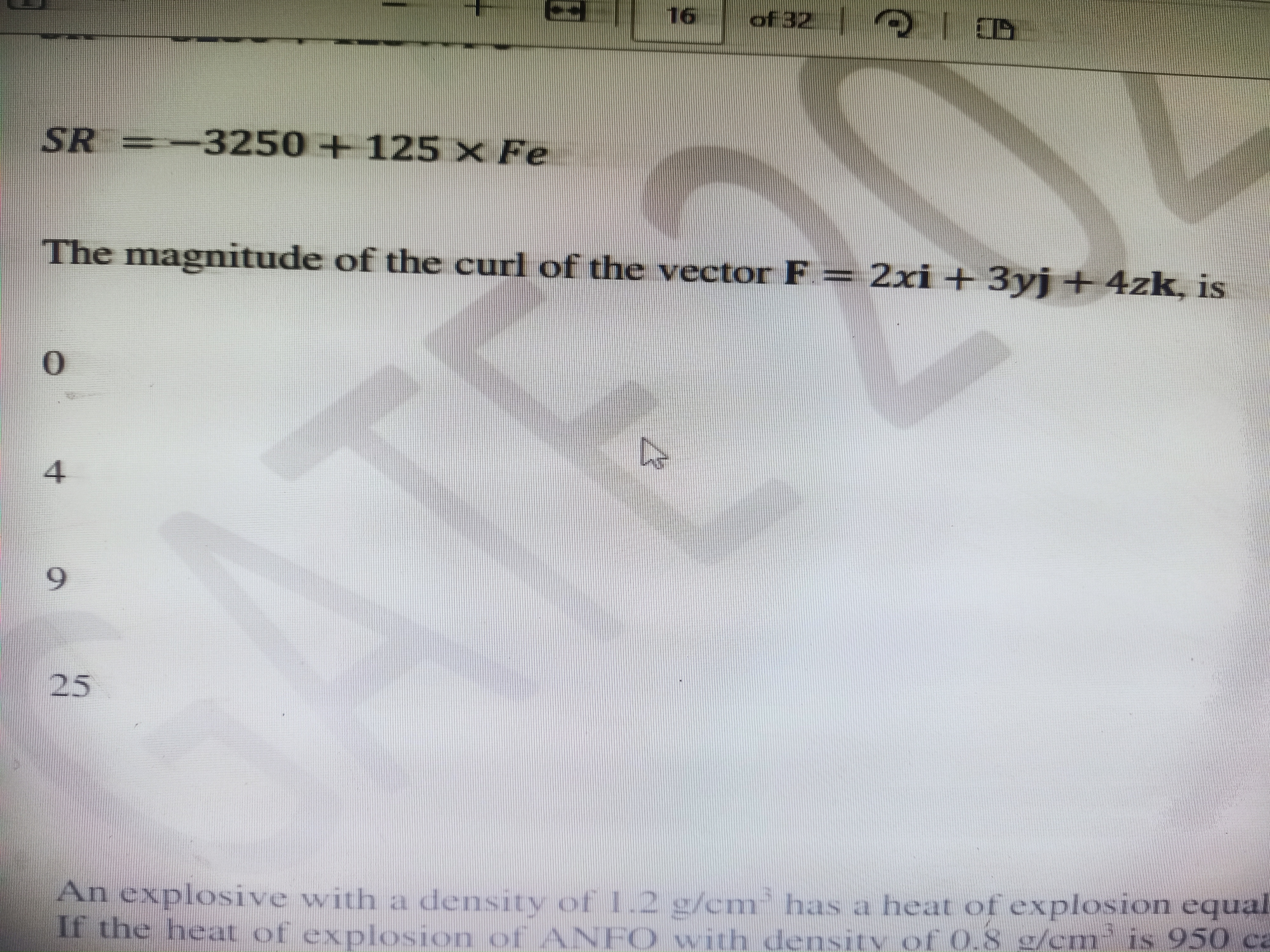The magnitude of the curl of the vector F = 2xi + 3yj + 4zk, is

Understand the Problem
The question is asking for the magnitude of the curl of the vector field F, which is given as F = 2xi + 3yj + 4zk. To solve this, we will use the mathematical definition of curl in vector calculus and compute the result accordingly.
Answer
The magnitude of the curl is $0$.
Answer for screen readers
The magnitude of the curl of the vector ( \mathbf{F} = 2xi + 3yj + 4zk ) is ( 0 ).
Steps to Solve
- Identify the components of the vector field F
The given vector field is ( \mathbf{F} = 2x \mathbf{i} + 3y \mathbf{j} + 4z \mathbf{k} ).
- Use the curl formula
The curl of a vector field ( \mathbf{F} = P \mathbf{i} + Q \mathbf{j} + R \mathbf{k} ) is given by:
$$ \nabla \times \mathbf{F} = \left( \frac{\partial R}{\partial y} - \frac{\partial Q}{\partial z} \right) \mathbf{i} + \left( \frac{\partial P}{\partial z} - \frac{\partial R}{\partial x} \right) \mathbf{j} + \left( \frac{\partial Q}{\partial x} - \frac{\partial P}{\partial y} \right) \mathbf{k} $$
- Calculate partial derivatives
For ( \mathbf{F} = 2x \mathbf{i} + 3y \mathbf{j} + 4z \mathbf{k} ):
- ( P = 2x )
- ( Q = 3y )
- ( R = 4z )
Calculating the partial derivatives:
- ( \frac{\partial R}{\partial y} = \frac{\partial (4z)}{\partial y} = 0 )
- ( \frac{\partial Q}{\partial z} = \frac{\partial (3y)}{\partial z} = 0 )
- ( \frac{\partial P}{\partial z} = \frac{\partial (2x)}{\partial z} = 0 )
- ( \frac{\partial R}{\partial x} = \frac{\partial (4z)}{\partial x} = 0 )
- ( \frac{\partial Q}{\partial x} = \frac{\partial (3y)}{\partial x} = 0 )
- ( \frac{\partial P}{\partial y} = \frac{\partial (2x)}{\partial y} = 0 )
- Substitute partial derivatives into the curl formula
Substituting into the curl formula:
$$ \nabla \times \mathbf{F} = \left( 0 - 0 \right) \mathbf{i} + \left( 0 - 0 \right) \mathbf{j} + \left( 0 - 0 \right) \mathbf{k} $$
This simplifies to:
$$ \nabla \times \mathbf{F} = 0 \mathbf{i} + 0 \mathbf{j} + 0 \mathbf{k} = \mathbf{0} $$
- Calculate the magnitude of the curl
The magnitude of the curl is given by:
$$ |\nabla \times \mathbf{F}| = 0 $$
The magnitude of the curl of the vector ( \mathbf{F} = 2xi + 3yj + 4zk ) is ( 0 ).
More Information
The curl of a vector field represents the rotation at a point in the field. In this case, since the curl is zero, it means the field is irrotational.
Tips
- Mixing up the components when calculating partial derivatives.
- Forgetting to fully apply the curl formula.
- Confusing curl with divergence; they are different operations.
AI-generated content may contain errors. Please verify critical information